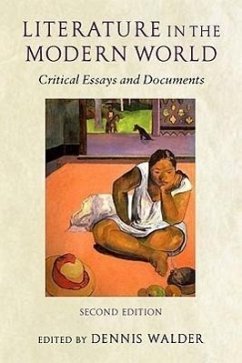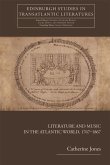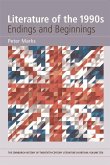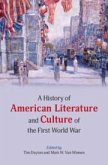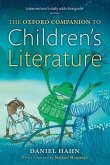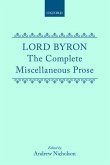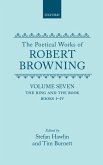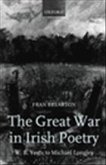- Broschiertes Buch
- Merkliste
- Auf die Merkliste
- Bewerten Bewerten
- Teilen
- Produkt teilen
- Produkterinnerung
- Produkterinnerung
This text offers a unique combination of English, European, American and Post-Colonial perspectives on literary study from the 1920s to the present day. Carefully introduced and arranged to highlight the development of debates, it is designed to engage newcomers to the field with some of the main themes and issues that will concern them as readers of modern literary texts of all genres. In the second edition, there is an increased focus on questions of gender and identity and on recent debates, such as "Literature and Nation" and "Literature and Value." The reach and relevance of the book has…mehr
Andere Kunden interessierten sich auch für
![Literature and Music in the Atlantic World, 1767-1867 Literature and Music in the Atlantic World, 1767-1867]() Catherine JonesLiterature and Music in the Atlantic World, 1767-1867129,99 €
Catherine JonesLiterature and Music in the Atlantic World, 1767-1867129,99 €![Literature of the 1990s Literature of the 1990s]() Peter MarksLiterature of the 1990s129,99 €
Peter MarksLiterature of the 1990s129,99 €![A History of American Literature and Culture of the First World War A History of American Literature and Culture of the First World War]() A History of American Literature and Culture of the First World War137,99 €
A History of American Literature and Culture of the First World War137,99 €![Oxford Companion to Children's Literature Oxford Companion to Children's Literature]() Daniel HahnOxford Companion to Children's Literature51,99 €
Daniel HahnOxford Companion to Children's Literature51,99 €![Lord Byron: The Complete Miscellaneous Prose Lord Byron: The Complete Miscellaneous Prose]() ByronLord Byron: The Complete Miscellaneous Prose451,99 €
ByronLord Byron: The Complete Miscellaneous Prose451,99 €![The Poetical Works of Robert Browning The Poetical Works of Robert Browning]() Robert BrowningThe Poetical Works of Robert Browning424,99 €
Robert BrowningThe Poetical Works of Robert Browning424,99 €![The Great War in Irish Poetry The Great War in Irish Poetry]() Fran BreartonThe Great War in Irish Poetry230,99 €
Fran BreartonThe Great War in Irish Poetry230,99 €-
-
-
This text offers a unique combination of English, European, American and Post-Colonial perspectives on literary study from the 1920s to the present day. Carefully introduced and arranged to highlight the development of debates, it is designed to engage newcomers to the field with some of the main themes and issues that will concern them as readers of modern literary texts of all genres. In the second edition, there is an increased focus on questions of gender and identity and on recent debates, such as "Literature and Nation" and "Literature and Value." The reach and relevance of the book has been extended, including more writers and critics from the world beyond Europe.
Hinweis: Dieser Artikel kann nur an eine deutsche Lieferadresse ausgeliefert werden.
Hinweis: Dieser Artikel kann nur an eine deutsche Lieferadresse ausgeliefert werden.
Produktdetails
- Produktdetails
- Verlag: Hurst & Co.
- 2nd edition
- Seitenzahl: 552
- Erscheinungstermin: 1. Januar 2004
- Englisch
- Abmessung: 233mm x 156mm x 29mm
- Gewicht: 762g
- ISBN-13: 9780199253012
- ISBN-10: 0199253013
- Artikelnr.: 22399256
- Herstellerkennzeichnung
- Libri GmbH
- Europaallee 1
- 36244 Bad Hersfeld
- gpsr@libri.de
- Verlag: Hurst & Co.
- 2nd edition
- Seitenzahl: 552
- Erscheinungstermin: 1. Januar 2004
- Englisch
- Abmessung: 233mm x 156mm x 29mm
- Gewicht: 762g
- ISBN-13: 9780199253012
- ISBN-10: 0199253013
- Artikelnr.: 22399256
- Herstellerkennzeichnung
- Libri GmbH
- Europaallee 1
- 36244 Bad Hersfeld
- gpsr@libri.de
Dennis Walder is Professor of Literature at the Open University and Founding Director of the Literature Department's Colonial and Post-Colonial Research Group. He has published widely on topics ranging from Dickens to V.S. Naipaul.
* General Introduction
* Part One: General Approaches
* I Questioning the Canon
* Introduction
* 1: Marylin Butler: Repossessing the Past: The Case for an Open
Literary History
* 2: Frank Kermode: Canon and Period
* 3: Terry Eagleton: Literature and the Rise of English
* 4: Sandra Gilbert and Susan Gubar: Women Poets
* 5: Henry Louis Gates, Jnr.: Literary Theory and the Black Tradition
* II Interpretation
* Introduction
* 1: E. D. Hirsch, Jnr.: The Babel of Interpretations
* 2: Stanley Fish: Interpreting the Variorium
* 3: Robert Scholes: Who Cares About the Text?
* 4: Hans Robert Jauss: Literary History as a Challenge to Literary
Theory
* 5: Geoffrey Hartman: The Interpreter's Freud
* III Commitment
* Introduction
* 1: Virginia Woolf: To Cambridge Women
* 2: Jean-Paul Sartre: Writing, Reading, and the Public
* 3: Theodor Adorno: Commitment
* 4: Italo Calvino: Right and Wrong Political Uses of Literature
* Part Two: Themes and Issues
* I Form and Genre
* Introduction
* 1: Seymour Chatman: Story and Narrative
* 2: Umberto Eco: Semiotics of Theatrical Performance
* 3: Martin Esslin: The Signs of Drama
* Close Reading
* II Modernisms
* Introduction
* 1: Paul Valery: Remarks on Poetry
* 2: Gerard Genette: Order in Narrative
* 3: Robert Scholes: Towards a Semiotics of Literature
* 4: George Lukacs: The Ideology of Modernism
* 5: Raymond Williams: Modernism and the Metropolis
* 6: Bonnie Kime Scott: Gender and Modernism
* III Literature and Nation
* Introduction
* 1: C. L. R. James: Beyond a Boundary
* 2: Virginia Woolf: Woman and Nationalism
* 3: Ashis Nandy: The Intimate Enemy
* 4: Timothy Brennan: The National Longing for Form
* 5: Salman Rushdie: Imaginary Homelands
* IV Literature and Ideology
* Introduction
* 1: Bertolt Brecht: A Short Organum for the Theatre
* 2: Terry Eagleton: Marxist Criticism
* 3: Pierre Macherey: The Text Says What It Does Not Say
* 4: Roland Barthes: The Death of the Author
* 5: Michel Foucault: What is an Author?
* V Literature and Gender
* Introduction
* 1: Simone de Beauvoir: Woman and the Other
* 2: Cora Kaplan: Language and Gender
* 3: Helene Cixous: Laugh of the Medusa
* 4: Toni Morrison: Rootedness: The Ancestor as Foundation
* 5: Eve Kosovsky Sedgewick: Introduction to Between Men
* 6: Judith Butler: Subjects of Sex/Gender/Desire
* VI End of Empire
* Introduction
* 1: Edward Said: The Discourse of the Orient
* 2: Seamus Heaney: Englands of the Mind
* 3: John McGrath: Behind the Cliches of Contemporary Theatre
* 4: Mary Louise Pratt: From the Victorian Nyanza to the Sheraton San
Salvador
* VII From Commonwealth to Post-Colonial
* Introduction
* 1: Frantz Fanon: On National Culture
* 2: Chinua Achebe: Colonialist Criticism
* 3: Kamau Brathwaite: History of the Voice
* 4: Bill Ashcroft, Gareth Griffiths, and Helen Tiffin: Post-Colonial
Reconstruction
* 5: Anne McClintock: The Angel of Progress
* 6: Stuart Hall: When Was The Post-Colonial?
* VIII Literature and History
* Introduction
* 1: Walter Benjamin: Theses on the Philosophy of History
* 2: Laurence Lerner: History and Fiction
* 3: Hayden White: Introduction to Metahistory
* 4: Jerome McGann: The Text, the Poem, and the Problem of Historical
Method
* 5: Joseph Brodsky: The Keening Muse
* 6: George Steiner: The Hollow Miracle
* 7: Paul de Man: Literary History and Literary Modernity
* IX Literature and Value
* Introduction
* 1: T. S. Eliot: What is a Classic
* 2: Barbara Hernstein Smith: The Exile of Evaluation
* Part One: General Approaches
* I Questioning the Canon
* Introduction
* 1: Marylin Butler: Repossessing the Past: The Case for an Open
Literary History
* 2: Frank Kermode: Canon and Period
* 3: Terry Eagleton: Literature and the Rise of English
* 4: Sandra Gilbert and Susan Gubar: Women Poets
* 5: Henry Louis Gates, Jnr.: Literary Theory and the Black Tradition
* II Interpretation
* Introduction
* 1: E. D. Hirsch, Jnr.: The Babel of Interpretations
* 2: Stanley Fish: Interpreting the Variorium
* 3: Robert Scholes: Who Cares About the Text?
* 4: Hans Robert Jauss: Literary History as a Challenge to Literary
Theory
* 5: Geoffrey Hartman: The Interpreter's Freud
* III Commitment
* Introduction
* 1: Virginia Woolf: To Cambridge Women
* 2: Jean-Paul Sartre: Writing, Reading, and the Public
* 3: Theodor Adorno: Commitment
* 4: Italo Calvino: Right and Wrong Political Uses of Literature
* Part Two: Themes and Issues
* I Form and Genre
* Introduction
* 1: Seymour Chatman: Story and Narrative
* 2: Umberto Eco: Semiotics of Theatrical Performance
* 3: Martin Esslin: The Signs of Drama
* Close Reading
* II Modernisms
* Introduction
* 1: Paul Valery: Remarks on Poetry
* 2: Gerard Genette: Order in Narrative
* 3: Robert Scholes: Towards a Semiotics of Literature
* 4: George Lukacs: The Ideology of Modernism
* 5: Raymond Williams: Modernism and the Metropolis
* 6: Bonnie Kime Scott: Gender and Modernism
* III Literature and Nation
* Introduction
* 1: C. L. R. James: Beyond a Boundary
* 2: Virginia Woolf: Woman and Nationalism
* 3: Ashis Nandy: The Intimate Enemy
* 4: Timothy Brennan: The National Longing for Form
* 5: Salman Rushdie: Imaginary Homelands
* IV Literature and Ideology
* Introduction
* 1: Bertolt Brecht: A Short Organum for the Theatre
* 2: Terry Eagleton: Marxist Criticism
* 3: Pierre Macherey: The Text Says What It Does Not Say
* 4: Roland Barthes: The Death of the Author
* 5: Michel Foucault: What is an Author?
* V Literature and Gender
* Introduction
* 1: Simone de Beauvoir: Woman and the Other
* 2: Cora Kaplan: Language and Gender
* 3: Helene Cixous: Laugh of the Medusa
* 4: Toni Morrison: Rootedness: The Ancestor as Foundation
* 5: Eve Kosovsky Sedgewick: Introduction to Between Men
* 6: Judith Butler: Subjects of Sex/Gender/Desire
* VI End of Empire
* Introduction
* 1: Edward Said: The Discourse of the Orient
* 2: Seamus Heaney: Englands of the Mind
* 3: John McGrath: Behind the Cliches of Contemporary Theatre
* 4: Mary Louise Pratt: From the Victorian Nyanza to the Sheraton San
Salvador
* VII From Commonwealth to Post-Colonial
* Introduction
* 1: Frantz Fanon: On National Culture
* 2: Chinua Achebe: Colonialist Criticism
* 3: Kamau Brathwaite: History of the Voice
* 4: Bill Ashcroft, Gareth Griffiths, and Helen Tiffin: Post-Colonial
Reconstruction
* 5: Anne McClintock: The Angel of Progress
* 6: Stuart Hall: When Was The Post-Colonial?
* VIII Literature and History
* Introduction
* 1: Walter Benjamin: Theses on the Philosophy of History
* 2: Laurence Lerner: History and Fiction
* 3: Hayden White: Introduction to Metahistory
* 4: Jerome McGann: The Text, the Poem, and the Problem of Historical
Method
* 5: Joseph Brodsky: The Keening Muse
* 6: George Steiner: The Hollow Miracle
* 7: Paul de Man: Literary History and Literary Modernity
* IX Literature and Value
* Introduction
* 1: T. S. Eliot: What is a Classic
* 2: Barbara Hernstein Smith: The Exile of Evaluation
* General Introduction
* Part One: General Approaches
* I Questioning the Canon
* Introduction
* 1: Marylin Butler: Repossessing the Past: The Case for an Open
Literary History
* 2: Frank Kermode: Canon and Period
* 3: Terry Eagleton: Literature and the Rise of English
* 4: Sandra Gilbert and Susan Gubar: Women Poets
* 5: Henry Louis Gates, Jnr.: Literary Theory and the Black Tradition
* II Interpretation
* Introduction
* 1: E. D. Hirsch, Jnr.: The Babel of Interpretations
* 2: Stanley Fish: Interpreting the Variorium
* 3: Robert Scholes: Who Cares About the Text?
* 4: Hans Robert Jauss: Literary History as a Challenge to Literary
Theory
* 5: Geoffrey Hartman: The Interpreter's Freud
* III Commitment
* Introduction
* 1: Virginia Woolf: To Cambridge Women
* 2: Jean-Paul Sartre: Writing, Reading, and the Public
* 3: Theodor Adorno: Commitment
* 4: Italo Calvino: Right and Wrong Political Uses of Literature
* Part Two: Themes and Issues
* I Form and Genre
* Introduction
* 1: Seymour Chatman: Story and Narrative
* 2: Umberto Eco: Semiotics of Theatrical Performance
* 3: Martin Esslin: The Signs of Drama
* Close Reading
* II Modernisms
* Introduction
* 1: Paul Valery: Remarks on Poetry
* 2: Gerard Genette: Order in Narrative
* 3: Robert Scholes: Towards a Semiotics of Literature
* 4: George Lukacs: The Ideology of Modernism
* 5: Raymond Williams: Modernism and the Metropolis
* 6: Bonnie Kime Scott: Gender and Modernism
* III Literature and Nation
* Introduction
* 1: C. L. R. James: Beyond a Boundary
* 2: Virginia Woolf: Woman and Nationalism
* 3: Ashis Nandy: The Intimate Enemy
* 4: Timothy Brennan: The National Longing for Form
* 5: Salman Rushdie: Imaginary Homelands
* IV Literature and Ideology
* Introduction
* 1: Bertolt Brecht: A Short Organum for the Theatre
* 2: Terry Eagleton: Marxist Criticism
* 3: Pierre Macherey: The Text Says What It Does Not Say
* 4: Roland Barthes: The Death of the Author
* 5: Michel Foucault: What is an Author?
* V Literature and Gender
* Introduction
* 1: Simone de Beauvoir: Woman and the Other
* 2: Cora Kaplan: Language and Gender
* 3: Helene Cixous: Laugh of the Medusa
* 4: Toni Morrison: Rootedness: The Ancestor as Foundation
* 5: Eve Kosovsky Sedgewick: Introduction to Between Men
* 6: Judith Butler: Subjects of Sex/Gender/Desire
* VI End of Empire
* Introduction
* 1: Edward Said: The Discourse of the Orient
* 2: Seamus Heaney: Englands of the Mind
* 3: John McGrath: Behind the Cliches of Contemporary Theatre
* 4: Mary Louise Pratt: From the Victorian Nyanza to the Sheraton San
Salvador
* VII From Commonwealth to Post-Colonial
* Introduction
* 1: Frantz Fanon: On National Culture
* 2: Chinua Achebe: Colonialist Criticism
* 3: Kamau Brathwaite: History of the Voice
* 4: Bill Ashcroft, Gareth Griffiths, and Helen Tiffin: Post-Colonial
Reconstruction
* 5: Anne McClintock: The Angel of Progress
* 6: Stuart Hall: When Was The Post-Colonial?
* VIII Literature and History
* Introduction
* 1: Walter Benjamin: Theses on the Philosophy of History
* 2: Laurence Lerner: History and Fiction
* 3: Hayden White: Introduction to Metahistory
* 4: Jerome McGann: The Text, the Poem, and the Problem of Historical
Method
* 5: Joseph Brodsky: The Keening Muse
* 6: George Steiner: The Hollow Miracle
* 7: Paul de Man: Literary History and Literary Modernity
* IX Literature and Value
* Introduction
* 1: T. S. Eliot: What is a Classic
* 2: Barbara Hernstein Smith: The Exile of Evaluation
* Part One: General Approaches
* I Questioning the Canon
* Introduction
* 1: Marylin Butler: Repossessing the Past: The Case for an Open
Literary History
* 2: Frank Kermode: Canon and Period
* 3: Terry Eagleton: Literature and the Rise of English
* 4: Sandra Gilbert and Susan Gubar: Women Poets
* 5: Henry Louis Gates, Jnr.: Literary Theory and the Black Tradition
* II Interpretation
* Introduction
* 1: E. D. Hirsch, Jnr.: The Babel of Interpretations
* 2: Stanley Fish: Interpreting the Variorium
* 3: Robert Scholes: Who Cares About the Text?
* 4: Hans Robert Jauss: Literary History as a Challenge to Literary
Theory
* 5: Geoffrey Hartman: The Interpreter's Freud
* III Commitment
* Introduction
* 1: Virginia Woolf: To Cambridge Women
* 2: Jean-Paul Sartre: Writing, Reading, and the Public
* 3: Theodor Adorno: Commitment
* 4: Italo Calvino: Right and Wrong Political Uses of Literature
* Part Two: Themes and Issues
* I Form and Genre
* Introduction
* 1: Seymour Chatman: Story and Narrative
* 2: Umberto Eco: Semiotics of Theatrical Performance
* 3: Martin Esslin: The Signs of Drama
* Close Reading
* II Modernisms
* Introduction
* 1: Paul Valery: Remarks on Poetry
* 2: Gerard Genette: Order in Narrative
* 3: Robert Scholes: Towards a Semiotics of Literature
* 4: George Lukacs: The Ideology of Modernism
* 5: Raymond Williams: Modernism and the Metropolis
* 6: Bonnie Kime Scott: Gender and Modernism
* III Literature and Nation
* Introduction
* 1: C. L. R. James: Beyond a Boundary
* 2: Virginia Woolf: Woman and Nationalism
* 3: Ashis Nandy: The Intimate Enemy
* 4: Timothy Brennan: The National Longing for Form
* 5: Salman Rushdie: Imaginary Homelands
* IV Literature and Ideology
* Introduction
* 1: Bertolt Brecht: A Short Organum for the Theatre
* 2: Terry Eagleton: Marxist Criticism
* 3: Pierre Macherey: The Text Says What It Does Not Say
* 4: Roland Barthes: The Death of the Author
* 5: Michel Foucault: What is an Author?
* V Literature and Gender
* Introduction
* 1: Simone de Beauvoir: Woman and the Other
* 2: Cora Kaplan: Language and Gender
* 3: Helene Cixous: Laugh of the Medusa
* 4: Toni Morrison: Rootedness: The Ancestor as Foundation
* 5: Eve Kosovsky Sedgewick: Introduction to Between Men
* 6: Judith Butler: Subjects of Sex/Gender/Desire
* VI End of Empire
* Introduction
* 1: Edward Said: The Discourse of the Orient
* 2: Seamus Heaney: Englands of the Mind
* 3: John McGrath: Behind the Cliches of Contemporary Theatre
* 4: Mary Louise Pratt: From the Victorian Nyanza to the Sheraton San
Salvador
* VII From Commonwealth to Post-Colonial
* Introduction
* 1: Frantz Fanon: On National Culture
* 2: Chinua Achebe: Colonialist Criticism
* 3: Kamau Brathwaite: History of the Voice
* 4: Bill Ashcroft, Gareth Griffiths, and Helen Tiffin: Post-Colonial
Reconstruction
* 5: Anne McClintock: The Angel of Progress
* 6: Stuart Hall: When Was The Post-Colonial?
* VIII Literature and History
* Introduction
* 1: Walter Benjamin: Theses on the Philosophy of History
* 2: Laurence Lerner: History and Fiction
* 3: Hayden White: Introduction to Metahistory
* 4: Jerome McGann: The Text, the Poem, and the Problem of Historical
Method
* 5: Joseph Brodsky: The Keening Muse
* 6: George Steiner: The Hollow Miracle
* 7: Paul de Man: Literary History and Literary Modernity
* IX Literature and Value
* Introduction
* 1: T. S. Eliot: What is a Classic
* 2: Barbara Hernstein Smith: The Exile of Evaluation

